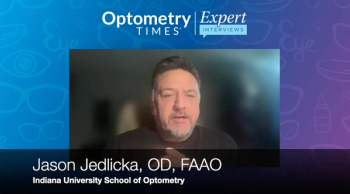
EyeCon 2022: Ensuring your patients receive thorough presbyopic care
Marc R. Bloomenstein, OD, FAAO, shares key takeaways from his EyeCon 2022 presentation, "Advances in presbyopia."
This transcript has been edited for clarity:
Kaiser:
Hello, I'm Emily Kaiser with Optometry Times and I'm sitting down with Dr. Marc Bloomenstein to discuss his presentation on advances in presbyopia at EyeCon 2022 in Marco Island, Florida. Welcome Dr. Bloomenstein. Thank you so much for taking the time to talk to us.
Bloomenstein:
Thanks, Emily, I got all dressed up just for our conversation. So hopefully people can appreciate that.
Kaiser:
Yeah, I mean, you look great. Can you give us a brief overview of your presentation?
Bloomenstein:
I'm fortunate enough to be lecturing with my good friend, Mile Brujic. Mile—out of Ohio—and I are both really, I would say, advocates of the ability for us to manage presbyopia. So we talk about advances in presbyopia.
I think, for the vast majority of clinicians, they think of presbyopia more along the lines of something we deal with, kind of like myopia or hyperopia. When the truth of the matter is, it's really a life-changing event.
For the vast majority of patients, you know, once we hit 40s, or 50s, and we start to lose the ability to focus up close. It's a harbinger of old age and it's representative challenges, and especially now with intermediate vision and close vision.
So the course is really designed just as kind of a thought process. Going into the lane and thinking about what can I do today to help you know, presbyopic patients either prepare for the time when this is going to happen. So those pre-presbyopes. Or like yourself, you know, when you've got good probably 10-20 years before you have to worry about it.
So, you know, more importantly, though, is what new things or new advances we have that we should provide and share with our patients. Mile does a lot more context, I do a lot more through practice surgery. So it's gonna dabble in pharmaceuticals, it's going to be cray cray, it's gonna be, it's gonna be off-the-hook.
Kaiser:
And how should clinicians respond to the information presented?
Bloomenstein:
Well, I always kind of feel, and you know, EyeCon is going to be no different is.. You want to go to a continuing education program and be able to take what you've just heard from your colleagues, evidence-based, and make it practical.
So, what I'm hoping doctors will do, or empower their staff [to do], is to be able to go in and give real world, real time applications of some of the things we talked about.
You know, there's some interesting studies, especially Mile's done in and around multifocal contacts. And I think just that small little tidbit of information on fitting patients with multifocal contact might make the difference between a patient saying, "These don't work," and "Let's see what we can do to benefit."
Kaiser:
And what do you hope optometrist take away from your talk?
Bloomenstein:
I think what I would really love them to take away is the fact that when patients come into our practice, we are their source for everything vision.
The things that I take for granted—the knowledge that I have—it's hard for me to sit there and realize that a patient doesn't know this.
So one of the things that I hope that ODs are going to take way and bring into the lane is the ability to dispense information that they may or may not think their patients want. And when you think of general practitioners, you think of a primary care doctor. Well, we're all of that.
We're specialists, and we're primary care doctors for everything that's included with the eye, but I think patients anticipate or expect a certain level of competence when it comes to talking about options and availability to be able to function with or without glasses.
And so, you know, it's really kind of seamless. I mean, when you talk about presbyopia, it's, I mean, there's nobody, nobody that can basically avoid becoming presbyopic. It's [if] you're breathing, then you're gonna become presbyopic. So it's something that we have to kind of think about with every patient that comes in our lane.
Newsletter
Want more insights like this? Subscribe to Optometry Times and get clinical pearls and practice tips delivered straight to your inbox.















































